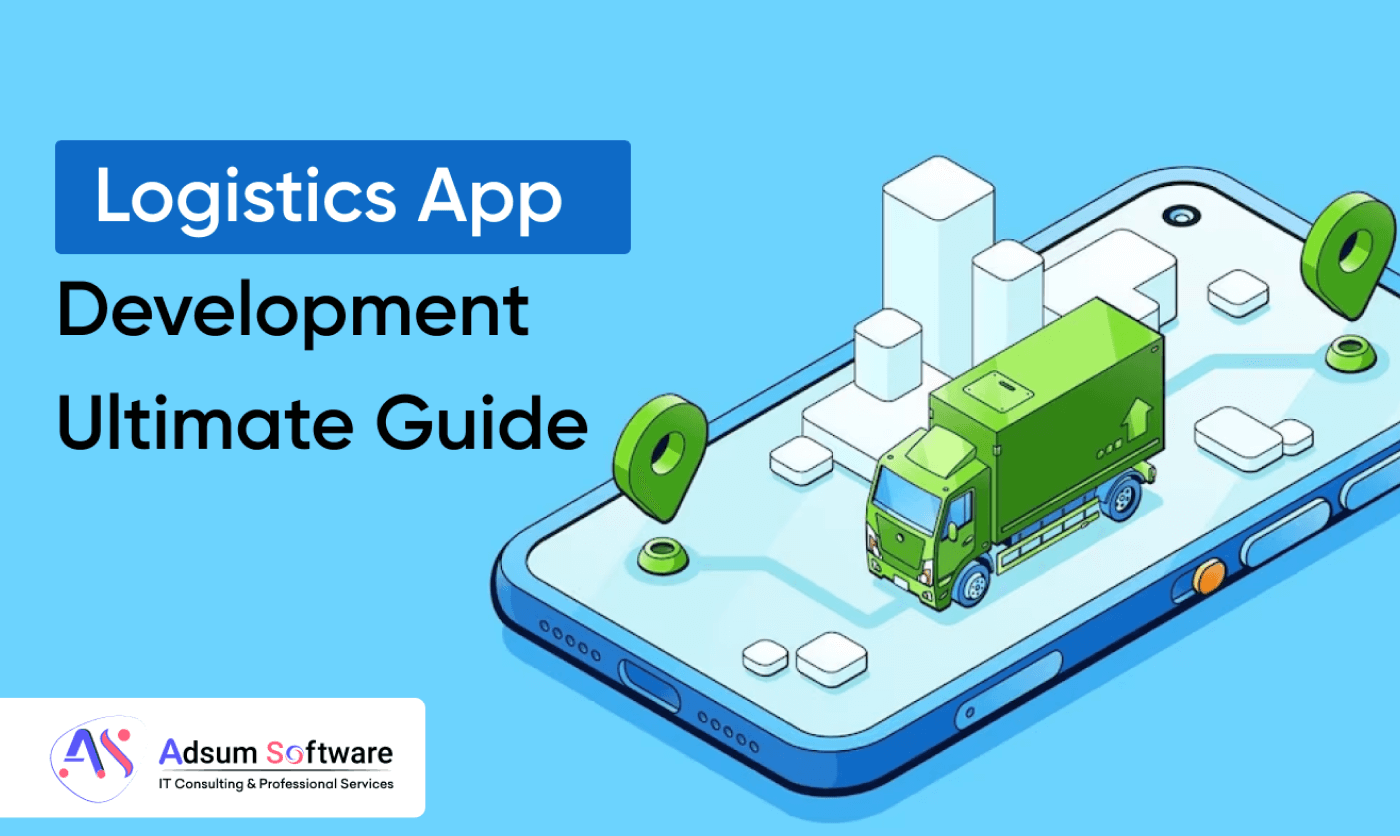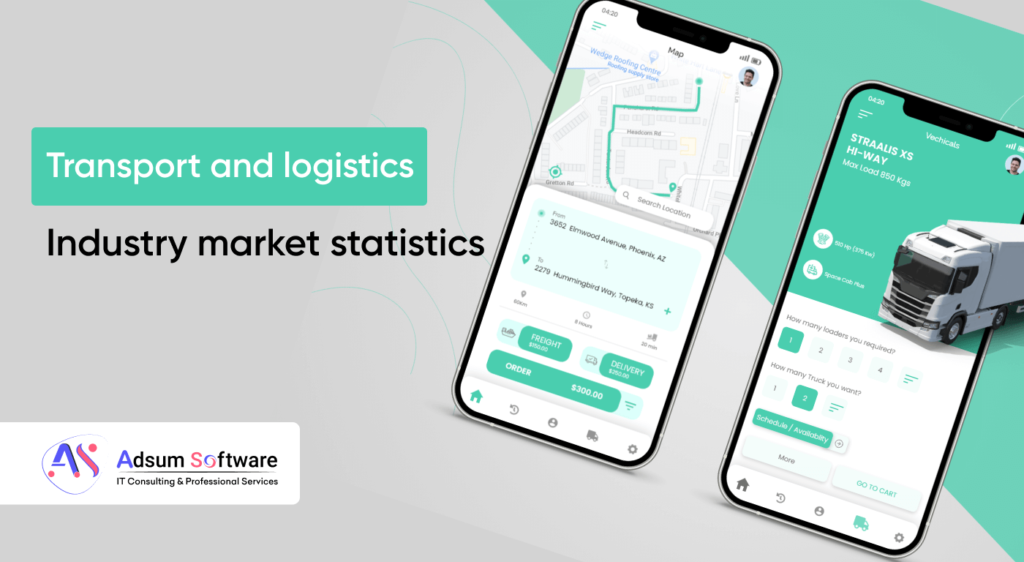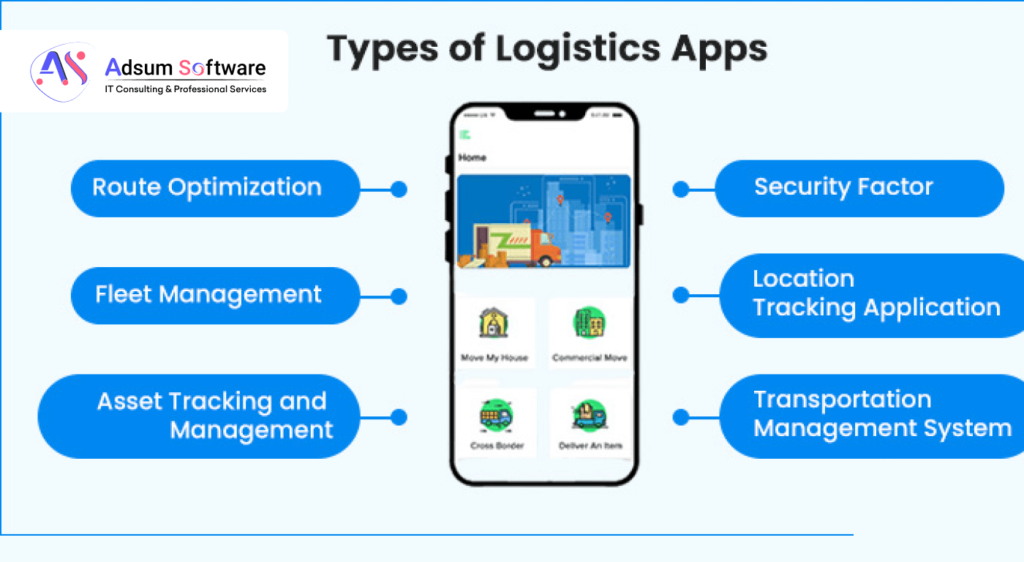Cookies help us to enhance your experience. By using the website for Adsum software, you consent to the gathering of data as set forth in our Cookie Policy.
Logistics App Development – Ultimate Adsum Guide

If you want to be in the logistics app industry, you need to understand that the digital approach is crucial for a profitable logistics business. It enhances transparency and cooperation, reducing concerns such as excessive time spent on load boards, truck breakdowns, and empty trucks.
This article covers the fundamentals of logistics app development, including the types of logistics apps available, key features to consider, commonly used technologies for implementation, challenges of logistics MVP development, and more. Additionally, we’ll guide you through the easiest way for transportation and logistics app development for your business.

Table of Contents
Transport and logistics industry market statistics
Based on recent trends and projections, here are some expected market statistics for the transportation and logistics industry in the US as of 2022.

According to the report of Research and Markets.com published by Businesswire, the global logistics market reached a value of $4.92 Trillion in 2021. The publisher anticipates the market to attain $6.55 trillion by 2027, growing at a CAGR of 4.7% during 2022-2027.
Why Is Logistics App Development Must For Transportation Businesses?
Logistics app development is crucial for transportation businesses because it provides a digital platform to manage and optimize their supply chain, improving efficiency, logistics app development cost savings, and enhancing customer experience.
These logistics mobile app help in transportation companies to track shipments, manage inventory, streamline communication between stakeholders, and gain real-time visibility into their operations.
With the help of custom logistics apps, transportation businesses can reduce manual errors, make informed data-driven decisions, and enhance customer service quality.
Furthermore, the transport logistics app helps in extending transportation businesses to stay competitive in an increasingly digital and tech-savvy world.
Top Benefits of Creating a Logistics App
Here are some of the top benefits of develop logistics apps for android or ios:
- Increased Efficiency
With the help of our transport logistics app development services, we help companies in streamlining their supply chain operations, automate workflows, and eliminate manual errors, leading to increased operational efficiency.
- Improved Customer Experience
Our skilled logistics app developer create such a app that gives businesses real-time visibility into their operations, enabling customers to track their shipments and receive timely updates, leading to an enhanced customer experience.
- Cost Savings
Being a logistics app development company, we can reduce the expenses of our customers through our android and ios apps. Through our app, the client can optimize supply chain operations and reduce transportation, inventory carrying, and labour costs, resulting in significant cost savings.
- Enhanced Decision-Making
With real-time data and analytics from our logistics mobile app development services, businesses can make data-driven decisions to improve their operations, reduce waste, and respond quickly to market changes.
- Eliminates Paperwork
Being a logistics app development company, our development of logistics mobile apps is crucial in eliminating the need for paperwork. Our logistics mobile app eliminates inconvenient service orders and paperwork by providing instant access to the company’s database and essential documents accompanying freight.
Types of Logistics Apps We Develop
Though several transport logistics apps are available, they are based on business objectives and requirements. Here are some of the top logistics app development solutions that we offer in the digital market:

- Fleet Management
Our logistics app development services provide fleet management apps that help in capturing and organising vehicle and fleet-related data and information. With these apps, businesses can centrally manage and coordinate their vehicles to streamline fleet operations and ensure smooth functioning.
- Supply chain management apps
These apps help businesses manage their entire supply chain by providing features such as vendor management, procurement, and demand planning.
- Last-mile delivery apps
These apps focus on optimizing the final stage of the delivery process, providing features such as route optimization, contactless delivery, and proof of delivery tracking.
- On demand Logistics apps
On-demand delivery and home service apps not only fulfil users’ needs instantly but also enable businesses to establish positive connections with their customers, setting them apart from other transport and logistics apps. We focus on delivering goods according to user requirements in on demand logistics apps.
- Warehouse mobile apps
These apps are used to store a vast amount of data related to products stored in warehouses, making it easy to access any information at any time. We develop apps that help businesses manage their inventory and warehouse operations by providing features such as barcode scanning, stock monitoring, and order fulfilment tracking.
- Tracking and forwarding applications
The purpose to develop this type of app is to provide help to concern companies in tracking and forwarding order. It help in analyzing the real-time information related to routes and the details related to the delivery of goods and products.
This feature of our app is especially important for businesses that prioritize timely delivery of shipments, as it enables them to display their drivers’ locations in real-time.
In addition to these solutions, there are several key business areas where on demand logistics app development solutions can be implemented, such as –
- order monitoring
- warehouse and inventory
- freight forwarding
- routing, goods and service delivery
- vehicle tracking
The transport and logistics industry is continuously expanding, and several well-established names have acquired a significant market share in the supply chain and logistics sector.

Logistics App Features to Integrate
In order to build a logistics apps that is both in high demand and beneficial to various industry participants, it is crucial for our logistics app developers to incorporate the following essential features:
| Feature | User Panel | Driver Panel | Admin Panel |
| User Registration | Sign-up and login functionality | Sign-up and login functionality | User management, access control, and permissions |
| Shipment Tracking | Real-time tracking of shipment location and status | Update shipment status and location | Monitor and track the progress of all shipments |
| Delivery Scheduling | Schedule pickup and delivery times | View and accept shipment requests | Assign drivers and vehicles to shipments |
| Payment Processing | Secure and easy-to-use payment processing | View earnings and manage payment details | View financial reports and manage payments |
| Reviews and Ratings | User can allow to give the feedback on the quality of service they received | View feedback and ratings from customers | Monitor and respond to customer feedback |
| Messaging | In-app messaging with customer support and drivers | Communicate with users and support staff | Communicate with drivers and customers |
| Notifications | Real-time alerts and notifications on shipment status changes | Receive alerts and notifications about new requests and jobs | Send notifications to users and drivers |
| GPS Navigation | Integration with GPS navigation systems for drivers | Directions to pickup and delivery locations and optimized routes | Monitor the location of all drivers in real-time |
| Document Management | Upload and share documents like invoices and receipts | Upload and share shipment documents and receipts with users | Manage shipment documents and track document status |
| Analytics and Reports | View shipment history and performance metrics | View earnings and performance metrics | Generate reports on usage, performance, and revenue |
Choosing the Best Tech Stack for Logistics App Development
The technology stack for logistics app development refers to a combination of programming languages, frameworks, libraries, and other tools used to develop an efficient and scalable logistics application.
The tech stack used by our skilled logistics app developers can significantly impact the performance, scalability, and user experience of the final product, as well as the development time and cost.
Here are some of the popular technology stacks for logistics app development offered by us include:
Front-end technologies:
- For better user-interface, we use CSS, HTML, and JavaScript
- React Native, Angular or Vue.js for building the mobile app
- Bootstrap, Material-UI for styling
Back-end technologies:
- Node.js and Express.js for the server-side logic
- MongoDB, MySQL, or PostgreSQL for the database
- AWS, Firebase or Azure for hosting and deploying the app
- For Payment gateway integration, we use such as Stripe and PayPal
Mobile App technologies:
- Android, iOS, Cross-platform like React Native, Flutter, Ionic, Xamarin.
- NoSQL for the database
- Apple Store and Google Play Store for deploying the app
- For Payment gateway integration, we use such as Stripe and PayPal
Additional technologies
- Database technology: MongoDB or MySQL
- Payment gateway integration: Stripe, Paypal, or another payment gateway
- Push notification: Firebase Cloud Messaging
- Maps Integration: Google Maps
- Cloud Platform: AWS, Google Cloud, or Azure
- Authentication and Authorization: JWT, OAuth, or other authentication
The choice of technology stack used by our logistics app developers may vary based on the specific requirements of the logistics application.
Step-by-Step Guide to Building a Logistics App
The development of a logistics app for android/ios requires a significant effort. We can follow a step-by-step process for developing the logistics app:
- Determine goals and requirements
The first step in logistics app development is determining goals and requirements. What are the issues the customer wants to solve with the app? What features do customers want to include in the transport logistics app? What platforms do customers want the app to be available on?
Defining these goals and requirements, we will help by creating a clear roadmap for the development process.
- Conduct market research
Once we have defined goals and requirements, conduct market research to better understand the target audience, competition, and industry trends, this information will help in identifying any gaps in the market so that our app can fill and inform the decisions about the app’s design and functionality to the client.
- Create a prototype and wireframe
The layout and functionality of an app can be visually represented through a wireframe. It’s a low-fidelity sketch of the app’s interface that helps customers map the logistics app features and user flows.
After obtaining a wireframe, the next step is to develop a prototype, which serves as a functional model of the transportation logistics app. Prototyping will help the customer identify any usability issues and make changes before investing more resources in development.
- Develop the backend
The backend is the app’s server-side that manages the app’s data, security, and functionality. Developing the backend is a crucial step in logistics app development, as it will enable the customer to manage inventory, track shipments, and generate reports.
- Design the user interface
To proceed further, we must design the user interface and the app’s front-end that users interact with. The main goal is to develop an intuitive and user-friendly interface, and we conduct user testing to ensure that it caters to the target audience’s requirements.
- Develop the app
Once we have completed the wireframe, prototype, backend, and user interface, we will start developing the logistics app. We surely follow the best practices for coding, such as using a modular approach to make the app more scalable and maintainable.
- Test and launch the app
After completing the logistics app development phase, our team of experts thoroughly tests it to identify and fix any bugs or usability issues. Once the app is ready, it’s time to launch it on the app stores and start marketing it to your target audience.
- Keep the app up-to-date
Once the app is launched, we keep a close eye on its performance and gather feedback from users to pinpoint areas that could be improved. Regular maintenance is crucial to ensure the app’s security and up-to-date with the latest technology, and we provide this service on a routine basis.
What is the estimated cost for creating a logistics app?
Measuring the logistics app development cost is not a one-size-fits-all approach, as it relies on multiple parameters. To determine the cost of developing the app, we analyze several categories, including:
- The platform you choose
- The complexity of the features you want to include
- The cost of UI/UX design
- The cost of integrating the necessary technologies
- Cost of app maintenance
- How long it takes for development to complete
Our client can expect higher logistics app development cost for developing complex mobile apps that require custom features and multiple screen transitions and navigation. The level of customization and platform-specific user experience design will significantly impact the app’s overall cost.
As a transport and logistics app development company, we categorize the app development process into two panels: one for the driver’s features and the other for the dispatcher’s panel. This categorization provides a general idea of the estimated resources required for building a logistics app.
Build On demand Logistics Apps Solutions with Adsum
Adsum is a comprehensive logistics app development company with extensive experience providing solutions to enterprise clients. Our services range from creating applications to optimize operational workflows to streamlining shipment management, inventory control, accounting, and staffing needs.
We deliver high-quality tools that are developed 3x faster than manual development. If you want to know more about our services and get a complete cost estimate, please don’t hesitate to contact us.

FAQ
Can you add the extra features after the launch of the logistics mobile app?
Yes, we can add the customize new features even after the launch of the transport logistic app. For further discussion, you can connect with our experts today.
What are some monetization strategies for a custom logistics app?
Based on the requirements and demand, we can incorporate several monetization options for your on demand logistics app, such as charging installation fees, implementing a freemium model, utilizing commission-based revenue streams, and displaying in-app advertisements.
What factors should I consider when selecting a logistics app development company?
Being one of the best transport and logistics app development companies we suggest you before choosing us – check out our previous works, find out our market sentiments by checking out our online reviews, and ratings on the listing portals. Additionally, it is crucial to learn about our team, and inquire about our business and subject matter proficiency.
How is the security and safety of my business data ensured?
At our company, safeguarding our clients’ data is a top priority, and we take every measure to ensure it remains secure and confidential. Our advanced data protection mechanisms utilize techniques such as encryption, secured keys, firewalls, and other security measures. We stand by our commitment to keeping our clients’ data safe and secure down to every last bit and byte.
Optimize your supply chain with our advanced logistics app development solutions. Improve efficiency, cut costs, and elevate the customer experience with our easy-to-use platform. Transform your business today – contact us for more information.
Let’s create a measurable impact on your business.
LET’S TALK AND GET STARTEDWe love to hear the ideas of startups and flawlessly carry them out to establish them as a Brand.
We provide a FREE CONSULTATION for 60 minutes!
 Call
Call adsum.software
adsum.software

 Mobile App Development
Mobile App Development
 Android App Development
Android App Development
 iOS App Development
iOS App Development
 Web App Development
Web App Development
 UI/UX Design
UI/UX Design
 Dedicated Development Team
Dedicated Development Team

